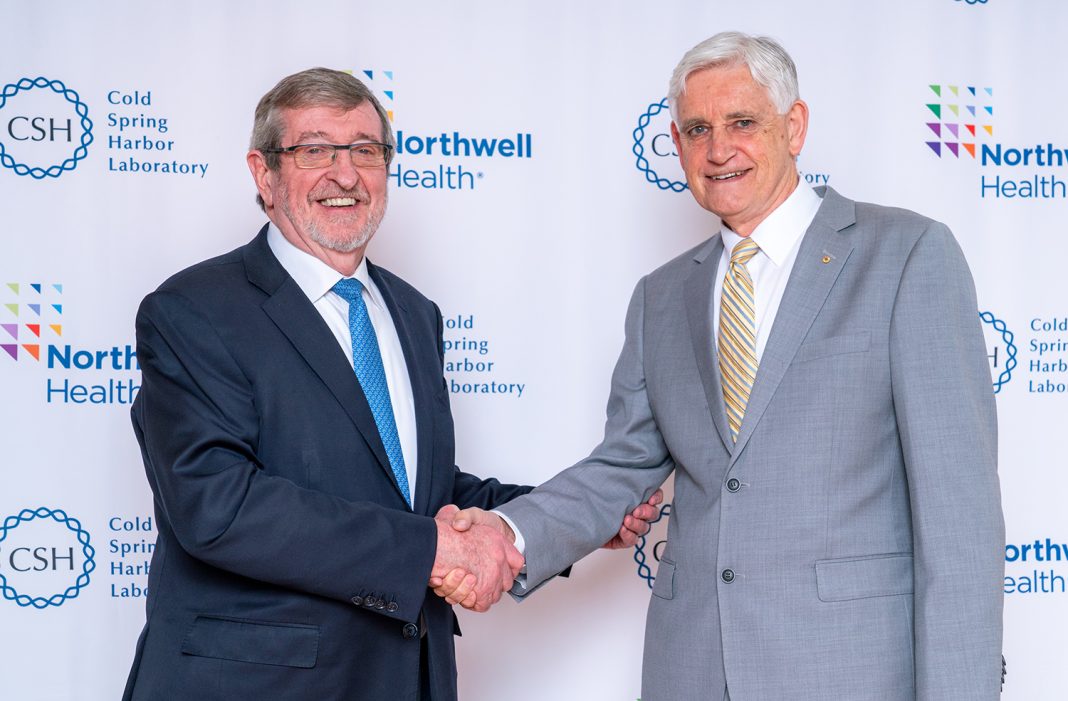Leaders from two of New York’s preeminent bioscience and healthcare institutions came together at Carnegie Hall to acknowledge the signing of an update to their affiliation agreement initiated in 2015. The Cold Spring Harbor Laboratory-Northwell Health affiliation aims to bring cutting-edge biology research to the bedside of tens of thousands of cancer patients in diverse communities across the state. The agreement ensures continued collaboration and support for ongoing clinical trials, among other advanced biotechnology initiatives.
“The alliance between Cold Spring Harbor Laboratory (CSHL) and Northwell Health brings transformative bioscience research into the clinic,” says CSHL President & CEO Bruce Stillman. “As New York’s largest healthcare provider, Northwell Health serves a remarkably diverse patient population. This agreement will provide patient communities with greater access to cutting-edge biomedical technology, allowing for more precise diagnoses and treatments, and ultimately facilitating new breakthroughs in cancer care.”
“Reaffirming our exclusive strategic affiliation with Cold Spring Harbor Laboratory and Northwell Health marks a pivotal moment in accelerating our efforts to advance cancer research and revolutionize treatment in the fight against cancer,” said Michael J. Dowling, president and CEO of Northwell Health. “We are building on nearly 10 years of shared vision and collaboration, merging cutting-edge discovery science with novel clinical trials to drive therapeutic applications for the patients we serve across the New York metropolitan area and beyond.”
The CSHL-Northwell Health affiliation aims to enhance biology and cancer research at CSHL’s NCI-designated Cancer Center and more than 60 research labs, as well as the Feinstein Institutes for Medical Research, the home of research at Northwell Health with 50 research labs and 5,000 researchers and staff systemwide. The affiliation also seeks to translate basic research into clinical applications, provide access to diverse patient populations, and train the next generation of scientist-clinicians. Over the past ten years, the affiliation has funded 82 research projects, resulting in more than 100 peer-reviewed publications. Through this integration, CSHL appointed 13 adjunct professors and trained 24 medical students, 27 residents and fellows. Together, they’ve initiated three clinical trials in various stages.
One of the affiliation’s greatest collaborations to date has been the development of more than 200 cancer organoid models through its organoid facility on Long Island. These living three-dimensional tissue models are derived from patient tumor cells and cultivated outside the body, in a clinical laboratory, for disease analysis and drug testing. This revolutionary technology in Phase-II clinical trials enables clinicians to predict favorable patient responses to new drug combinations. The CSHL-Northwell Health affiliation has also led to significant discoveries in pancreatic cancer, leukemia, glioblastoma, and COVID-19 research.
Northwell Health and the Northwell Health Cancer Institute, with its 400 physicians and researchers, have significantly expanded their oncology footprint since the initial CSHL affiliation was announced in 2015. Over the past three years, the Northwell Health Cancer Institute has invested nearly $550 million to open and expand cancer treatment centers throughout Long Island and the boroughs. Major initiatives include the $32 million, 37,000-square-foot outpatient Northwell Cancer Institute at Rego Park, Queens, which serves one of the most diverse communities in the country; and the $43 million, 40,000-square-foot Florina Cancer Center in Staten Island, which provides adult and pediatric care. In addition, the health system is building a new 200,000-square-foot medical pavilion adjacent to Northwell Lenox Hill Hospital in Manhattan, which will be anchored by an innovative cancer center. Northwell Health treats more than 19,000 people with cancer through its integrated health system and nine cancer centers.
